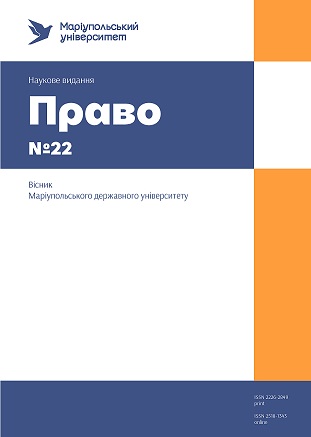

 | Наукова періодика України | 
| Вісник Маріупольського державного університету |
Назаренко А. М. Порівняльно-правовий аналіз законодавчого закріплення кваліфікуючої ознаки крадіжки "з проникненням у житло, інше приміщення чи сховище" / А. М. Назаренко // Вісник Маріупольського державного університету. Серія : Право. - 2014. - Вип. 7. - С. 261-267. - Режим доступу: http://nbuv.gov.ua/UJRN/Vmdu_pr_2014_7_33 У статті з використанням порівняльного методу вивчено зарубіжний досвід законодавчого закріплення кваліфікуючої ознаки крадіжки «з проникненням у житло, інше приміщення чи сховище». Проведений аналіз кримінальних кодексів держав континентальної Європидав підстави для того, щоб запропонувати зміни до відповідної норми Кримінального кодексу України. У дослідженні завдяки порівняльно-правовому аналізу були виявлені загальні риси і особливості побудови кримінально-правових норм, що встановлюють відповідальність за крадіжку, поєднану з проникненням у житло, інше приміщення чи сховище, у законодавстві різних європейських держав. Проведений у статті порівняльно-правовий аналіз законодавчого закріплення кваліфікуючої ознаки крадіжки «з проникненням у житло,інше приміщення чи сховище» дав можливість виявити та врахувати зарубіжні досягнення при вирішенні питань кримінально-правової охорони власності від злочинів даної категорії та, на цій основі, сформулювати пропозиції щодо удосконалення відповідної кримінально-правової норми.В статье с использованием сравнительного метода изучен зарубежный опыт законодательного закрепления квалифицирующего признака кражи «с проникновением в жилье, другое помещение или хранилище». Проведенный анализ уголовных кодексов государств континентальной Европы дал основания для того, чтобы предложить изменения к соответствующей норме Уголовного кодекса Украины. В исследовании благодаря сравнительно-правовому анализу были выявлены общие черты и особенности построения уголовно-правовых норм, устанавливающих ответственность за кражу, совмещенную с проникновением в жилье, другое помещение или хранилище, в законодательстве различных европейских государств. Проведенный в статье сравнительно-правовой анализ законодательного закрепления квалифицирующего признака кражи «с проникновением в жилье, другое помещение или хранилище» дал возможность выявить и учесть зарубежные достижения при решении вопросов уголовно-правовой охраны собственности от преступлений данной категории и, на этой основе, сформулировать предложения по усовершенствованию соответствующей уголовно-правовой нормы.The article studies the international experience of providing the legislative framework for a qualifying criterion for theft «with breaking and entering residential premises, other premises or accommodation». It proves the reasonability and necessity of admitting the fact of theft with breaking and entering residential premises, other premises or accommodation as an aggravating circumstance. Such offences not only infringe the right for property, but also abuse the constitutional guarantee of the inviolability of residence (Article 30 of the Constitution of Ukraine). Moreover, the above mentioned offences represent such a method of theft, which inflicts, as a rule, a greater extent of material damage. The attention is also paid to the fact that quite often it is impossible to commit theft without any efforts to eliminate obstacles. The above mentioned offences may also reflect a greater degree of anti-social activity of an individual if compared with other crimes. As a rule, such method of committing crimes is a proof of exceptional motivation of an individual committing theft and speaks of the offender's intention to take possession of property in spite of any obstacles. The analysis of the norm under research gave us grounds for the conclusion that the wording that is stipulated by Part 3 of Article 185 of the Criminal Code of Ukraine complies at its maximum to such principle of criminalization such as the constitutional adequacy. The essence of which lies in the fact that the Constitution of Ukraine has the highest legal power in accordance with Article 8. Laws, including the Criminal Code, are adopted on the basis of the Constitution and must comply with it. The comparative legal analysis discovered common features and peculiarities of structuring criminal-legal norms, which create liability for theft combined with breaking and entering residential premises in the legislation of different European countries, and namely: Azerbaijan, Belarus, Estonia, Spain, Latvia, Moldova, Germany, Poland, the Russian Federation, France and others. We determined a number of countries, criminal codes of which specify methods of breaking-in, for example, with the help of a forged key, by removing a barrier or a door latch, by deceit, break-in or forced entrylocker and safe burglary, ruination of walls, ceilings, breaking doors, windows and others. It is said that the increased social threat of theft offences is determined not by the very fact of using technical tools or methods of secret stealing of property, but by the fact that a person using them facilitates his/her unlawful breaking into residential premises, other premises or accommodation, acts more insolently, makes efforts to overcome obstacles in gaining access to another person's property. Therefore, a detailed description of all technical means and methods of breaking-in burdens the dispositions of the respective norms and is unnecessary. One more essential difference in formulations of the criminal-legal norms is using the terms «illegal» or «unlawful» in dispositions as such related to breaking into residential premises, other premises or accommodation. That is we speak of the absence of the guilty person's right to be in such a location. The analysis of the judicial practice discovered qualifying mistakes in this category of cases when, for example, a guilty person is invited to a household or lives together with the aggrieved party, has keys or free access to a household and other. A distinct reference in the disposition of Part 3 Article 185 of the Criminal Code of Ukraine helps to avoid such problems by pointing to the illegitimacy of breaking into residential premises, other premises or accommodation. Thus, the conducted comparative analysis of the Ukrainian and foreign legislation led us to the conclusion about the advisability of applying the international experience to the issue in question. Цитованість авторів публікації: Бібліографічний опис для цитування: Назаренко А. М. Порівняльно-правовий аналіз законодавчого закріплення кваліфікуючої ознаки крадіжки "з проникненням у житло, інше приміщення чи сховище" / А. М. Назаренко // Вісник Маріупольського державного університету. Серія : Право. - 2014. - Вип. 7. - С. 261-267. - Режим доступу: http://nbuv.gov.ua/UJRN/Vmdu_pr_2014_7_33. |
|
|
Всі права захищені © Національна бібліотека України імені В. І. Вернадського |
|||||